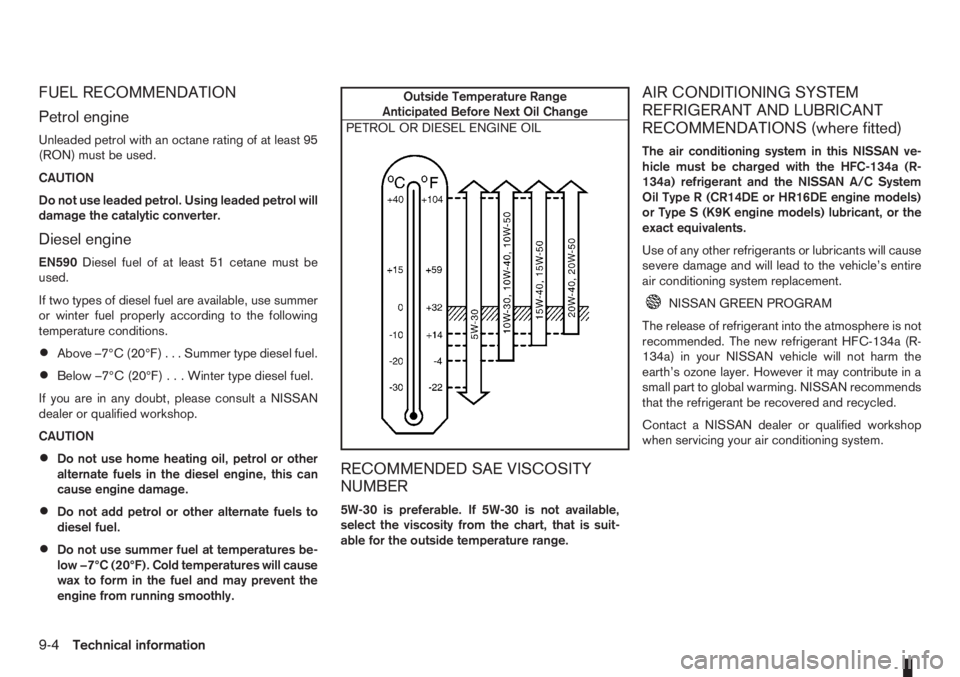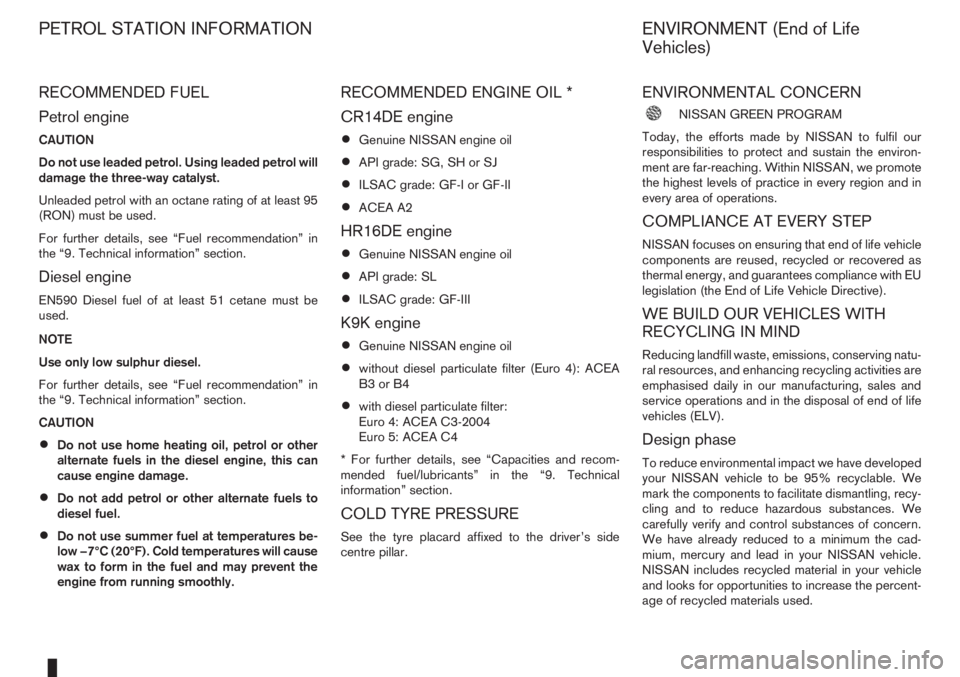2012 NISSAN NOTE unleaded
[x] Cancel search: unleadedPage 128 of 235

NISSAN GREEN PROGRAM
The three-way catalyst is an emission control device
installed in the exhaust system. In the converter,
exhaust gases are burned at high temperatures to
help reduce pollutants.
CAUTION
•The exhaust gas and the exhaust system are
very hot. While the engine is running, keep
people or flammable materials away from the
exhaust pipe.
•Do not stop or park the vehicle over flam-
mable materials such as dry grass, waste pa-
per or rags, as they may burn easily.
•When parking, ensure that people or flam-
mable materials are kept away from the ex-
haust pipe.
TO HELP PREVENT DAMAGE
CAUTION
•Use UNLEADED PETROL ONLY, specifically
the recommended type. For details, see “Ca-
pacities and recommended fuel/lubricants” in
the “9. Technical information” section.
•Do not use leaded petrol. Leaded petrol will
seriously damage three-way catalyst.
Deposits from leaded petrol will seriously re-
duce the three-way catalyst’s ability to help
reduce exhaust pollutants.
•Keep your engine tuned up. Malfunctions in
the ignition, fuel injection, or electrical sys-
tems can cause over-rich fuel flow into the
converter, causing it to overheat.
•Avoid driving with an extremely low fuel level.
Running out of fuel could cause the engine to
misfire, damaging the three-way catalyst.
•Do not keep driving if the engine misfires, or
if noticeable loss of performance or other un-
usual operating conditions are detected. Have
the vehicle inspected promptly by a NISSAN
dealer or qualified workshop.
•Do not race the engine while warming it up.
•Do not push or tow your vehicle to start the
engine.The turbocharger system uses engine oil for lubrica-
tion and cooling of its rotating components. The tur-
bocharger turbine turns at extremely high speeds
and it can reach an extremely high temperature. It is
essential to maintain a flow of clean oil through the
turbocharger system. A sudden interruption to the
oil supply may cause a malfunction in the turbo-
charger.
To ensure prolonged life and performance of the
turbocharger, it is essential to comply with the fol-
lowing maintenance procedure:
CAUTION
•Change the engine oil of the turbo-charged
diesel engine as prescribed. See the sepa-
rately provided Warranty Information & Main-
tenance Booklet for additional information.
•Use only the recommended engine oil. See
“Capacities and recommended fuel/
lubricants” in the “9. Technical information”
section.
•If the engine has been operating at high rpm
for an extended period of time, let it idle for a
few minutes prior to shutdown.
•Do not accelerate the engine to high rpm im-
mediately after starting it.
THREE-WAY CATALYST (Petrol
engine models)TURBOCHARGER SYSTEM
(Diesel engine models)
5-4Starting and driving
Page 212 of 235

FUEL RECOMMENDATION
Petrol engine
Unleaded petrol with an octane rating of at least 95
(RON) must be used.
CAUTION
Do not use leaded petrol. Using leaded petrol will
damage the catalytic converter.
Diesel engine
EN590Diesel fuel of at least 51 cetane must be
used.
If two types of diesel fuel are available, use summer
or winter fuel properly according to the following
temperature conditions.
•Above –7°C (20°F)...Summer type diesel fuel.
•Below–7°C(20°F)...Wintertypedieselfuel.
If you are in any doubt, please consult a NISSAN
dealer or qualified workshop.
CAUTION
•Do not use home heating oil, petrol or other
alternate fuels in the diesel engine, this can
cause engine damage.
•Do not add petrol or other alternate fuels to
diesel fuel.
•Do not use summer fuel at temperatures be-
low −7°C (20°F). Cold temperatures will cause
wax to form in the fuel and may prevent the
engine from running smoothly.
Outside Temperature Range
Anticipated Before Next Oil Change
PETROL OR DIESEL ENGINE OIL
m
RECOMMENDED SAE VISCOSITY
NUMBER
5W-30 is preferable. If 5W-30 is not available,
select the viscosity from the chart, that is suit-
able for the outside temperature range.
AIR CONDITIONING SYSTEM
REFRIGERANT AND LUBRICANT
RECOMMENDATIONS (where fitted)
The air conditioning system in this NISSAN ve-
hicle must be charged with the HFC-134a (R-
134a) refrigerant and the NISSAN A/C System
Oil Type R (CR14DE or HR16DE engine models)
or Type S (K9K engine models) lubricant, or the
exact equivalents.
Use of any other refrigerants or lubricants will cause
severe damage and will lead to the vehicle’s entire
air conditioning system replacement.
NISSAN GREEN PROGRAM
The release of refrigerant into the atmosphere is not
recommended. The new refrigerant HFC-134a (R-
134a) in your NISSAN vehicle will not harm the
earth’s ozone layer. However it may contribute in a
small part to global warming. NISSAN recommends
that the refrigerant be recovered and recycled.
Contact a NISSAN dealer or qualified workshop
when servicing your air conditioning system.
9-4Technical information
Page 229 of 235

RECOMMENDED FUEL
Petrol engine
CAUTION
Do not use leaded petrol. Using leaded petrol will
damage the three-way catalyst.
Unleaded petrol with an octane rating of at least 95
(RON) must be used.
For further details, see “Fuel recommendation” in
the “9. Technical information” section.
Diesel engine
EN590 Diesel fuel of at least 51 cetane must be
used.
NOTE
Use only low sulphur diesel.
For further details, see “Fuel recommendation” in
the “9. Technical information” section.
CAUTION
•Do not use home heating oil, petrol or other
alternate fuels in the diesel engine, this can
cause engine damage.
•Do not add petrol or other alternate fuels to
diesel fuel.
•Do not use summer fuel at temperatures be-
low −7°C (20°F). Cold temperatures will cause
wax to form in the fuel and may prevent the
engine from running smoothly.
RECOMMENDED ENGINE OIL *
CR14DE engine
•Genuine NISSAN engine oil
•API grade: SG, SH or SJ
•ILSAC grade: GF-I or GF-II
•ACEA A2
HR16DE engine
•Genuine NISSAN engine oil
•API grade: SL
•ILSAC grade: GF-III
K9K engine
•Genuine NISSAN engine oil
•without diesel particulate filter (Euro 4): ACEA
B3 or B4
•with diesel particulate filter:
Euro 4: ACEA C3-2004
Euro 5: ACEA C4
* For further details, see “Capacities and recom-
mended fuel/lubricants” in the “9. Technical
information” section.
COLD TYRE PRESSURE
See the tyre placard affixed to the driver’s side
centre pillar.
ENVIRONMENTAL CONCERN
NISSAN GREEN PROGRAM
Today, the efforts made by NISSAN to fulfil our
responsibilities to protect and sustain the environ-
ment are far-reaching. Within NISSAN, we promote
the highest levels of practice in every region and in
every area of operations.
COMPLIANCE AT EVERY STEP
NISSAN focuses on ensuring that end of life vehicle
components are reused, recycled or recovered as
thermal energy, and guarantees compliance with EU
legislation (the End of Life Vehicle Directive).
WE BUILD OUR VEHICLES WITH
RECYCLING IN MIND
Reducing landfill waste, emissions, conserving natu-
ral resources, and enhancing recycling activities are
emphasised daily in our manufacturing, sales and
service operations and in the disposal of end of life
vehicles (ELV).
Design phase
To reduce environmental impact we have developed
your NISSAN vehicle to be 95% recyclable. We
mark the components to facilitate dismantling, recy-
cling and to reduce hazardous substances. We
carefully verify and control substances of concern.
We have already reduced to a minimum the cad-
mium, mercury and lead in your NISSAN vehicle.
NISSAN includes recycled material in your vehicle
and looks for opportunities to increase the percent-
age of recycled materials used.
PETROL STATION INFORMATION ENVIRONMENT (End of Life
Vehicles)